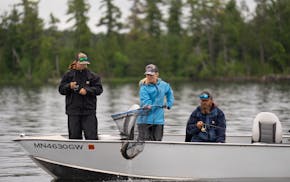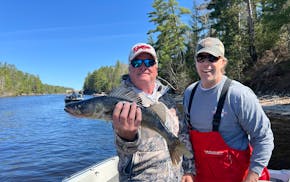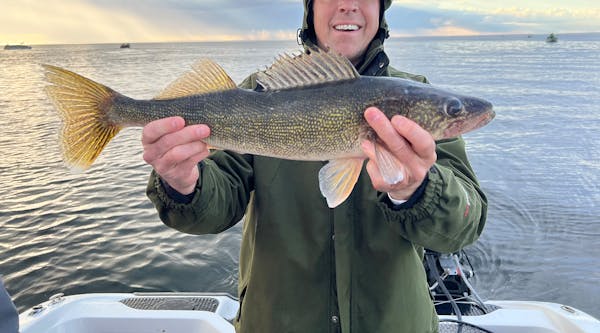Saturday, when Minnesota's inland walleye and northern pike seasons begin anew, the fishing, as always, will be fantastic.
And the catching? You heard it here first: It'll be fast and furious.
To make this admittedly out-on-a-limb prediction, I looked at statewide ice-out dates, which obviously were early this spring, and also considered peak days that Department of Natural Resources Fisheries Division employees collected walleye eggs during this spring's spawning runs.
But mostly I recalled the cool weather and delayed crappie runs that prevailed after the early ice-out dates in 2012 to reach my determination that fishing (and catching) will be productive Saturday when the 2024 season begins — just as it was on the 2012 opener.
On Leech Lake, for example, one of Minnesota's major walleye haunts, the ice went out this year on April 12, more than two weeks ahead of the April 28 median ice-out date.
In 2012, Leech's ice-out also occurred early, April 2, a record.
Ditto on Upper Red, another popular walleye destination for anglers, where the ice went out this year on April 9. In 2012, the ice on this giant walleye factory also was gone early, on March 27.
Perhaps more important still than ice-out dates when trying to predict opening day walleye fishing success is the weather that prevails after the ice is gone.
Similar to this year, cool weather was the norm in 2012 between ice-out and the opener, preventing lake water from warming.
Telltale of springtime water temperatures, which in turn are telltale of air temperatures, is the timing of crappie spawning runs into shallow water.
Here's what Mark Fisher, Rapala field promotions director, told me for a column published on May 8, 2012, a few days before the walleye opener that year:
"Look at what's happened with crappies this spring. Instead of a definite move into the shallows to feed, and then to spawn, they've been moving in and out," Fisher said.
Now consider what Bob "Chub" Bruber, who has fished sunnies and crappies in the Chisago Lakes area since 1972, told me when I talked to him last Wednesday.
"The early ice this spring didn't trigger early crappie runs," he said. "Generally, this spring, due to the cool weather, crappies have been staging in deeper water, before moving in to shallow water if the sun comes out. Then they move back out again when it cools."
Mille Lacs, where this spring's March 16 ice-out date was a record, provides another case study of walleye spawning times when ice goes out early followed by cool weather and low water temperatures.
Last year, spring came late, and the Chippewa bands who net Mille Lacs buoyed their meshwork May 1 and finished May 10. This year, following the early ice-out, the bands set nets a couple of times in late March but didn't catch much — because the lake's walleyes hadn't yet run into the shallows.
On April 3, the bands again set their nets in Mille Lacs and experienced peak catches between April 10-14. But as of Wednesday, May 1, they still hadn't caught their quota.
DNR treaty fisheries coordinator Tom Jones in the agency's Aitken office explains this spring's prolonged spawning season this way:
"When the ice goes out early, some walleyes are close to being ready to spawn, but some aren't. So the spawning season following an early ice-out usually is spread out over a longer period than it is during late ice-out, when most walleyes are ready to spawn more or less at the same time."
Fishing guide Jeff Sundin of Grand Rapids agrees Saturday's walleye opener should be good.
"On a lot of openers, boats hang together because the fish are bunched up," he said. "On this opener, the spawn will be over, and it might be a good year to venture away from the crowds to find smaller groups of fish."
Also similar between spring 2012 and this spring are the dates the DNR started and ended its walleye egg-taking operations, the first step in its stocking program.
This year, those efforts began April 9 and ended April 24. In 2012, the beginning and end dates were generally similar — March 26 and April 21 — while during the late spring a year ago, by comparison, egg collection didn't begin until April 19, with a May 7 ending.
DNR statewide fish production coordinator Paula Phelps said the DNR collects eggs from five different genetic strains of walleyes.
"Certain strains spawn earlier than others," she said. "So if a spawning run ends for one strain before we get all the eggs we need from that strain, we have to go to another location to collect the remaining eggs."
Another indicator, I believe, that fishing will be good on Saturday's opener is the timing of walleye movements in recent months on the Mississippi River south of the Twin Cities, which, rather than being affected by the early spring, were in lockstep with most previous years.
"Everything on the river has been on schedule, said Dick "Griz" Grzywinski of St. Paul. "Walleyes and sauger were on fire downriver from the Red Wing dam until about April 10, when they moved up to the dam. And at Prescott, where they usually start spawning April 15, this year it was the 13th."
One factor affecting fishing this spring on the Mississippi could have statewide ramifications on Saturday's opener: low water.
"We've gotten some rain lately, which has helped the level of Upper Red," said Kevin Waldo, co-owner of West Wind Resort. "But the lake is still down 6 to 8 inches from normal. Last fall, we dredged the channel in front of our place, so I don't think we'll have problems with boats getting in and out. But it could be an issue in some places."
Epilogue:
In 2012, my wife, Jan, our younger son, Cole, and a few boatloads of friends opened on Crane Lake, on the Minnesota-Ontario border. At day's end, we had more than enough walleyes to feed the 25 anglers in our bunch.
This year, depending on the wind, we'll open either on Upper Red or Winnibigoshish. And, as in 2012, we expect to do well.
You read it here first.

Anderson: In early June, Minnesota fish are begging to be caught. Won't you help?

Anderson: Tails wagging, DNR officers' dogs find lost people and missing evidence
Anderson: Punish poachers more
Anderson: The Chainsaw Sisters Saloon is gone, but the Echo Trail is still a pathway to possibilities


